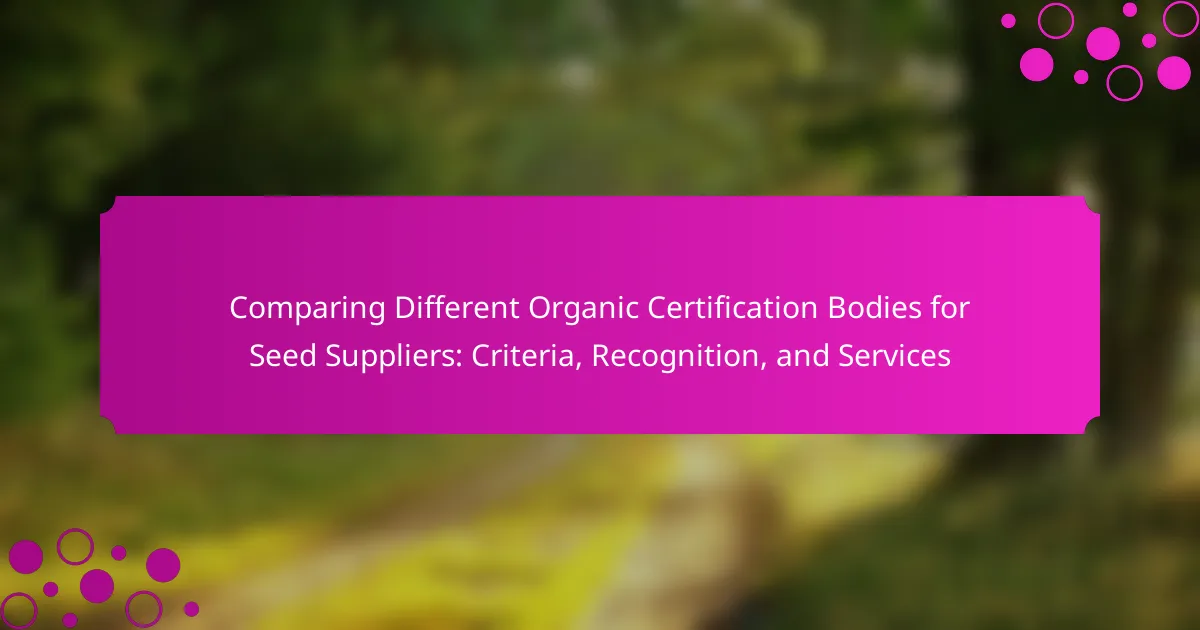Organic Certification Bodies are organizations responsible for verifying that seed suppliers comply with established organic farming standards. This article compares various certification bodies, such as the USDA National Organic Program in the United States, the Soil Association in the UK, and Ecocert in Europe, focusing on their criteria for compliance, recognition processes, and the services they provide to seed suppliers. Key topics include the assessment of farming practices, seed sourcing, and production methods, as well as the importance of maintaining organic integrity through inspections and audits. The article also highlights the unique requirements of different certification bodies and their role in enhancing consumer trust and market access for organic products.

What are Organic Certification Bodies for Seed Suppliers?
Organic certification bodies for seed suppliers are organizations that verify compliance with organic farming standards. These bodies assess seed suppliers to ensure their products meet specific organic criteria. Certification involves a detailed review of farming practices, seed sourcing, and production methods.
In the United States, the USDA National Organic Program (NOP) is a prominent certifying body. It establishes standards for organic agriculture, including seed quality and sourcing. Other countries have their own certification bodies, such as the Soil Association in the UK and Ecocert in Europe.
These organizations provide guidance on organic practices and help maintain the integrity of organic labeling. They also conduct inspections and audits to ensure ongoing compliance. Compliance with organic standards is crucial for market access and consumer trust.
How do Organic Certification Bodies function?
Organic certification bodies function by establishing standards for organic farming and food production. They evaluate compliance with these standards through inspections and documentation review. These bodies assess farms, processing facilities, and products to ensure adherence to organic practices. They also provide certification to entities that meet the required criteria. The certification process typically includes an application, inspection, and review of records. After successful evaluation, the body issues a certificate that allows the entity to market products as organic. This process helps maintain the integrity and trust in organic labeling. According to the USDA, certified organic products must meet strict guidelines that promote environmentally sustainable practices.
What are the key roles of Organic Certification Bodies?
Organic Certification Bodies ensure compliance with organic standards. They evaluate and verify organic farming practices. These bodies conduct inspections and audits of farms and processing facilities. They issue organic certificates to compliant entities. This certification allows products to be labeled as organic. Organic Certification Bodies also provide guidance on organic regulations. They help educate farmers about organic practices. Their role supports consumer trust in organic products.
How do these bodies ensure compliance with organic standards?
Organic certification bodies ensure compliance with organic standards through a rigorous process of inspection and documentation. They conduct annual inspections of farms and production facilities. Inspectors assess practices related to soil management, pest control, and crop rotation. Certification bodies require detailed records from producers, including inputs used and harvest data. They also review compliance with regulations set by governing bodies, such as the USDA in the United States. Non-compliance can result in penalties, including the loss of certification. This systematic approach helps maintain the integrity of organic labeling and consumer trust.
Why is organic certification important for seed suppliers?
Organic certification is important for seed suppliers because it verifies that their seeds meet specific organic standards. This certification assures consumers that the seeds are produced without synthetic pesticides or fertilizers. It also enhances marketability, as organic products often command higher prices. Certified seeds are crucial for organic farmers who rely on them to maintain their organic status. According to the USDA, organic certification helps maintain the integrity of the organic supply chain. Additionally, it fosters consumer trust and loyalty in organic products. Overall, organic certification is essential for compliance, market access, and consumer confidence.
What benefits does organic certification provide to seed suppliers?
Organic certification provides seed suppliers with access to a growing market for organic products. This certification enhances the credibility of their seeds among consumers. It also allows suppliers to command higher prices due to increased demand for organic seeds. Certified seeds are often required for organic farming practices, ensuring compliance with regulations. Additionally, organic certification can improve supplier relationships with retailers who prioritize organic offerings. The certification process also encourages better farming practices, leading to improved soil health and biodiversity. According to the USDA, the organic market has seen consistent growth, reflecting the benefits of certification for seed suppliers.
How does organic certification impact consumer trust?
Organic certification significantly enhances consumer trust. It provides assurance that products meet specific organic standards. These standards are regulated by recognized bodies, ensuring transparency in production processes. Consumers often perceive certified organic products as healthier and more environmentally friendly. A study by the Organic Trade Association found that 82% of consumers trust organic labels. This trust leads to increased purchasing decisions. Certified organic products often command higher prices, reflecting consumer confidence. Overall, organic certification serves as a critical factor in fostering trust between consumers and producers.

What criteria do different Organic Certification Bodies use?
Different Organic Certification Bodies use various criteria to ensure compliance with organic standards. Common criteria include the prohibition of synthetic pesticides and fertilizers. They also require the use of organic seeds whenever possible. Soil health management practices are emphasized, including crop rotation and cover cropping. Certification bodies assess the avoidance of genetically modified organisms (GMOs). Record-keeping and traceability are mandatory for all organic operations. Additionally, some bodies may have specific criteria for livestock treatment and feed. The USDA Organic Certification, for instance, mandates a three-year transition period for land before it can be certified organic. Each certification body may have unique requirements based on regional regulations and standards.
How do criteria vary among different certification bodies?
Criteria among different certification bodies vary significantly based on their specific standards and requirements. Each certification body may prioritize different attributes such as environmental practices, input materials, and production methods. For example, the USDA Organic certification focuses on prohibiting synthetic pesticides and fertilizers. In contrast, the EU Organic certification emphasizes biodiversity and soil health. Additionally, some bodies may require annual inspections, while others might have a more flexible assessment approach. The differences in criteria can affect the certification process duration and cost. These variations impact seed suppliers’ choices in obtaining organic certification.
What are the common criteria used for organic certification?
Common criteria for organic certification include adherence to specific agricultural practices. These practices emphasize the use of organic seeds, natural pest control methods, and soil fertility management. Organic certification also requires the absence of synthetic fertilizers and pesticides. Additionally, it mandates record-keeping of farming practices and inputs. Compliance with regulations set by recognized certification bodies is essential. Regular inspections and audits are conducted to ensure ongoing compliance. Many countries have established organic standards that must be met for certification. These standards often align with international guidelines, such as those set by the USDA or the EU.
What unique criteria might specific certification bodies have?
Specific certification bodies may have unique criteria tailored to their standards. For example, the USDA’s National Organic Program requires compliance with specific agricultural practices. These include prohibiting synthetic pesticides and fertilizers. Additionally, the European Union’s organic certification mandates a minimum of three years of organic soil management before certification. Some bodies, like the California Certified Organic Farmers, emphasize the importance of local ecological conditions. Each certification body may also have distinct record-keeping and traceability requirements. These unique criteria ensure that the certification process aligns with the specific goals of the organization.
What role do standards play in organic certification?
Standards are essential in organic certification as they establish the criteria that must be met for products to be labeled as organic. These standards ensure that agricultural practices promote ecological balance and biodiversity. They set guidelines for soil health, pest management, and the use of synthetic substances. Compliance with these standards is verified through inspections and documentation. Regulatory bodies, such as the USDA in the United States, enforce these standards to maintain consumer trust. The presence of clear standards helps differentiate organic products from conventional ones. This differentiation is crucial for market integrity and consumer confidence. Standards also facilitate international trade by providing a common framework for organic certification.
How are standards developed for organic certification?
Standards for organic certification are developed through a collaborative process involving stakeholders. These stakeholders include farmers, certifiers, consumers, and regulatory agencies. The process typically begins with the identification of core principles of organic farming, such as sustainability and biodiversity.
Next, scientific research and practical experiences are reviewed to establish guidelines. These guidelines outline acceptable practices and prohibited substances. Draft standards are then created and made available for public comment.
Feedback from the community is considered to refine the standards further. After revisions, the standards are finalized and published. Regulatory bodies may then adopt these standards to ensure consistency and compliance.
For example, the USDA National Organic Program sets federal standards in the United States, incorporating input from various stakeholders. This multi-faceted approach ensures that the standards are both scientifically sound and reflective of community values.
What challenges exist in maintaining consistent standards?
Maintaining consistent standards in organic certification presents several challenges. Variability in criteria among different certification bodies can lead to inconsistencies. These discrepancies may confuse seed suppliers and consumers alike. Additionally, the lack of uniformity in regulatory frameworks across regions complicates compliance. Frequent updates to standards can create difficulties in adaptation for organizations. Limited resources for smaller certification bodies may hinder their ability to enforce standards effectively. Moreover, varying interpretations of the same standards can lead to disputes. These challenges collectively impact the reliability of organic certification processes.

How are Organic Certification Bodies recognized?
Organic Certification Bodies are recognized through accreditation by national or international standards organizations. These bodies must comply with specific regulations set by authorities such as the USDA in the United States or the European Commission in the EU. Accreditation ensures that the certification body adheres to rigorous guidelines for organic farming practices. The recognition process typically involves an evaluation of the certification body’s procedures, staff qualifications, and compliance with organic standards. Additionally, these bodies may participate in mutual recognition agreements to enhance their credibility across borders. For example, the International Federation of Organic Agriculture Movements (IFOAM) provides global recognition to organic certifiers that meet their standards. This recognition is crucial for maintaining consumer trust and ensuring the integrity of organic products in the market.
What recognition processes exist for these certification bodies?
Recognition processes for certification bodies include accreditation by recognized organizations. These organizations evaluate the certification body’s compliance with established standards. Accreditation ensures that the certification body operates in accordance with international guidelines. It typically involves a thorough assessment of the certification body’s procedures and practices. Many countries have their own national accreditation bodies. These bodies are often members of international organizations like the International Accreditation Forum (IAF). This membership indicates adherence to global best practices. Certification bodies may also seek recognition from specific industry groups. This recognition can enhance their credibility within niche markets.
What organizations oversee the recognition of certification bodies?
The organizations that oversee the recognition of certification bodies include the International Organization for Standardization (ISO) and the International Accreditation Forum (IAF). ISO sets global standards for various sectors, including certification processes. The IAF ensures the consistency and reliability of certification bodies worldwide. Both organizations work to maintain high standards in the accreditation of certification bodies. Their recognition is essential for ensuring credibility in certification practices.
How does recognition affect the credibility of certification bodies?
Recognition enhances the credibility of certification bodies by validating their processes and standards. When a certification body is recognized by a reputable organization, it signals adherence to established benchmarks. This recognition often involves rigorous evaluations and assessments. Such assessments ensure that the certification body meets industry-specific requirements. For instance, bodies recognized by ISO or national accreditation organizations demonstrate compliance with international standards. This compliance fosters trust among stakeholders, including consumers and businesses. As a result, certified products are perceived as more reliable and of higher quality. Recognition also helps certification bodies gain visibility and respect within their respective industries.
What are the implications of certification body recognition for seed suppliers?
Certification body recognition significantly impacts seed suppliers. It enhances credibility and trust among consumers. Recognized certification bodies ensure compliance with established agricultural standards. This compliance can lead to increased market access and sales opportunities. Suppliers can differentiate their products in a competitive market. Recognition may also facilitate partnerships with retailers and distributors. Furthermore, it can lead to potential price premiums for certified seeds. Studies show that certified organic products often command higher prices than non-certified counterparts.
How does recognition influence market access for seed suppliers?
Recognition enhances market access for seed suppliers by establishing credibility. It signals compliance with industry standards and consumer expectations. Recognized seed suppliers often gain trust from retailers and consumers. This trust can lead to increased sales and market share. For example, suppliers with organic certification can access premium markets. These markets often offer higher prices for certified products. Research shows that recognized certifications can boost consumer willingness to pay. Recognition can also facilitate partnerships with distributors and retailers. This expands distribution channels and increases visibility in the market.
What benefits does recognition provide to certified seed suppliers?
Recognition provides several benefits to certified seed suppliers. It enhances their credibility in the market. This credibility can lead to increased trust from farmers and consumers. Recognized suppliers often gain access to a broader customer base. They may also benefit from marketing support and promotional opportunities. Recognition can improve their competitive edge against non-certified suppliers. Additionally, it may open doors to partnerships with agricultural organizations. Recognized suppliers often receive updates on industry standards and practices. This knowledge helps them maintain compliance and improve product quality.

What services do Organic Certification Bodies offer to seed suppliers?
Organic Certification Bodies offer various services to seed suppliers. They provide certification services to verify compliance with organic standards. This includes assessing seed production methods and materials used. They conduct inspections of seed suppliers’ facilities and practices. Training and guidance on organic farming practices are also offered. Additionally, they assist in the development of organic seed production plans. These bodies may provide resources for understanding organic regulations. They also help in maintaining records for traceability and compliance. Overall, these services ensure that seed suppliers meet the necessary organic certification requirements.
What types of support do certification bodies provide?
Certification bodies provide various types of support to seed suppliers. They offer guidance on compliance with organic standards. This includes assistance with documentation and record-keeping requirements. Certification bodies also conduct training sessions for seed suppliers. These sessions cover best practices in organic farming and certification processes. Additionally, they provide resources such as manuals and guidelines. Certification bodies may also offer consultation services to help suppliers navigate challenges. They often maintain communication channels for ongoing support and updates on regulatory changes. This comprehensive support aids seed suppliers in achieving and maintaining organic certification.
How do certification bodies assist with the certification process?
Certification bodies assist with the certification process by providing guidance, assessment, and verification services. They help organizations understand the specific requirements for certification. Certification bodies conduct audits to evaluate compliance with standards. They also offer training and resources to prepare applicants for the certification process. Additionally, these bodies issue certificates upon successful completion of the assessment. Their role ensures that the certification process is transparent and reliable. This builds trust among consumers and stakeholders in certified products.
What educational resources are available through certification bodies?
Certification bodies provide various educational resources. These resources include training programs, workshops, and online courses. They often publish guidelines and best practices for organic certification. Many certification bodies offer webinars and seminars for continuous education. Some provide access to research publications and case studies. Additionally, certification bodies may offer mentorship programs for new suppliers. These resources help seed suppliers understand certification requirements. They also promote compliance with organic standards.
How can seed suppliers choose the right certification body?
Seed suppliers can choose the right certification body by evaluating several key criteria. First, they should assess the certification body’s accreditation status. Accredited bodies meet specific industry standards, ensuring credibility. Next, suppliers should consider the certification body’s reputation in the market. A well-regarded body is more likely to be recognized by customers and stakeholders.
Additionally, suppliers need to review the services offered by the certification body. Some bodies provide additional resources, such as training and support, which can be beneficial. Cost is another important factor; suppliers should compare fees to ensure they fit within their budget.
Lastly, suppliers should verify the certification body’s experience with their specific type of seeds. Specialized knowledge can lead to more effective certification processes. By carefully evaluating these criteria, seed suppliers can select a certification body that best meets their needs.
What factors should seed suppliers consider in their selection process?
Seed suppliers should consider certification standards, seed quality, and supplier reliability in their selection process. Certification standards ensure compliance with organic regulations. Seed quality impacts crop yield and health. Supplier reliability affects the consistency of supply and support. Additionally, suppliers should evaluate the variety of seeds offered. This includes assessing adaptability to local climates and resistance to pests. Pricing and availability also play crucial roles in decision-making. Research indicates that these factors contribute significantly to a supplier’s success in the organic market.
What are some best practices for maintaining certification?
Regularly review certification requirements to stay compliant. Certification bodies may update their standards. Attend training sessions to remain informed about changes. Maintain accurate records of all organic practices and inputs used. Conduct internal audits to ensure ongoing adherence to guidelines. Engage with certification bodies for updates and clarifications. Participate in relevant workshops and conferences for continuous education. Foster a culture of compliance within the organization to prioritize certification maintenance.
The main entity of this article is Organic Certification Bodies for seed suppliers, which are organizations that verify compliance with organic farming standards. The article provides a comprehensive comparison of various certification bodies, focusing on their criteria for certification, the recognition processes that enhance their credibility, and the services they offer to seed suppliers. Key aspects include the importance of organic certification for market access and consumer trust, the criteria used by different certification bodies, and the challenges in maintaining consistent standards across regions. Additionally, the article outlines best practices for seed suppliers in selecting the appropriate certification body and maintaining their certification.
